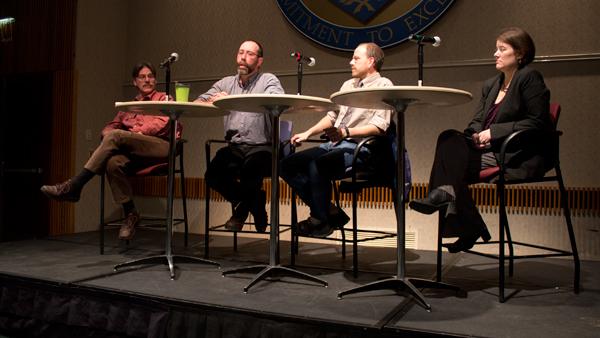As eco-friendly practices have become more popular at Ithaca College, professors are working to find a way to incorporate social and academic sustainability practices into the classroom.
About 40 people, including students, faculty and members of the community, came together Monday for “The Big Talk,” a panel discussion to address the leading issues facing sustainability, including recycling, composting, reusable shopping bags and energy awareness.
The discussion was led by a panel with Mark Darling, sustainability programs coordinator, as the moderator. The panel included Jason Hamilton, chair of environmental studies and sciences and education director of the college Natural Lands; Aimee Dars Ellis, professor of management in the school of sustainable enterprise and business; and Thomas Pfaff, professor of mathematics.
The conversation began with a definition of sustainability. However, Hamilton said there is no universal definition because it is a concept with multiple layers of meaning.
“It’s a fuzzy word that has no meaning and therefore shouldn’t be used anymore,” Hamilton said. “What I would argue is that there [are] all kinds of really fundamental, crucial concepts that we can’t define in a simple, distinct statement.”
After establishing that there is no concrete definition, each of the panelists gave their own interpretation of sustainability.
Pfaff said sustainability is centered around humans and making the world a better place with improvement.
“Sustainability is not about maintaining the status quo,” Pfaff said. “Sustainability is talking about constant improvement in something.”
Hamilton’s definition focused on how sustainability affects the standard of living, improving humanity and future generations.
“It’s a simple notion of trying to maintain our standard of living and improve humanity across the board, whether is be social justice, equity, energy supplies without sacrificing future generations and what they might need,” Hamilton said.
Dars Ellis said there are many vital parts to sustainability, none of which should be overlooked.
“I agree with that definition, and I was also thinking about some of the things that we might assume go with it but don’t necessarily talk about, like the environmental justice component, sustainability and systems thinking,” Dars Ellis said, “There are so many different moving pieces to the sustainability puzzle.”
After sharing their definitions, the panelists talked about the difficulties of integrating aspects of sustainability into the academic setting in classes.
Dars Ellis said it is hard to include a topic like this into most classes in the business school, especially to offer a class focusing solely on the topic. Dars Ellis added that business students should not be left out of the conversation. She tries to incorporate videos and projects topics as often as she can.
“I would encourage my students to try to expand their thinking beyond boundaries of their discipline and really try to embrace this notation that critical thinking and systems thinking should be on what the discipline says and to think more of the long term and not just about the short term,” Dars Ellis said.
Senior Madison Vander Hill also asked about how classes can be incorporated into more structured programs, like physical therapy or pre-professional programs.
In response, Pfaff said the community can get involved with spreading the information about sustainability.
“Let’s not waste people either,” Pfaff said. “A conversation gets sent around campus about making a decision about compostable versus disposable versus reusable.”
Panelists transitioned away from sustainability in academics to more global issues of sustainability, such as buying locally grown produce, reusable shopping bags and being aware of how much energy we actually use.
“You can only hope that one behavior leads to another, leads to another,” Darling said. “Here in centrally isolated Ithaca, we see a lot of those behaviors coming together, and it does leave you with that thought, ‘Is this doing any good?’”
Once discussion opened to allow students to voice questions, the focus switched back to sustainability in the Ithaca community.
Vander Hill said though she valued the diversity among the panel, she did have a little criticism.
“I wanted to know about the social justice issues that come out of the sustainability movement or that are incorporated in it,” Vander Hill said.
Alec Mitchell ’12 works for Weaver Wind Energy, a company dedicated to building the world’s most reliable wind turbine in Ithaca. He said community action is necessary to make a difference in the environment. For this to happen, Mitchell said, the community needs to open up their minds.
“People need to open up and accept the fact that how we live is so far away from how we need to live,” Mitchell said.








